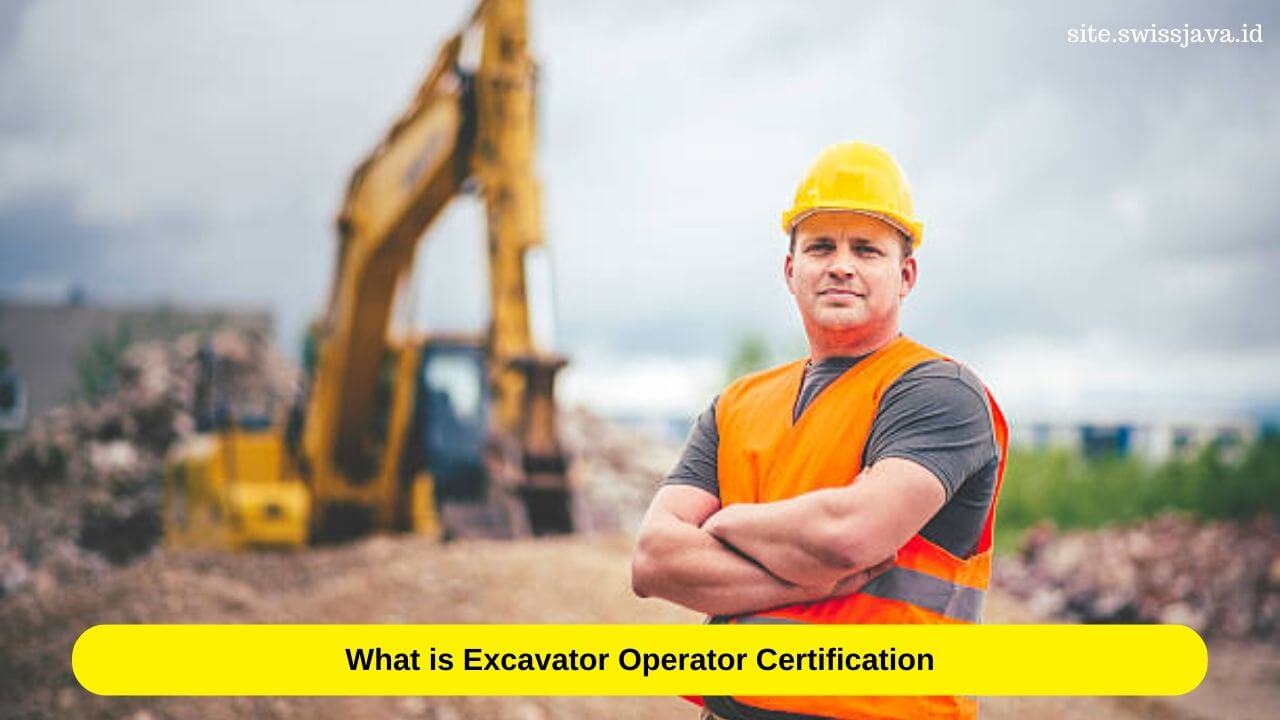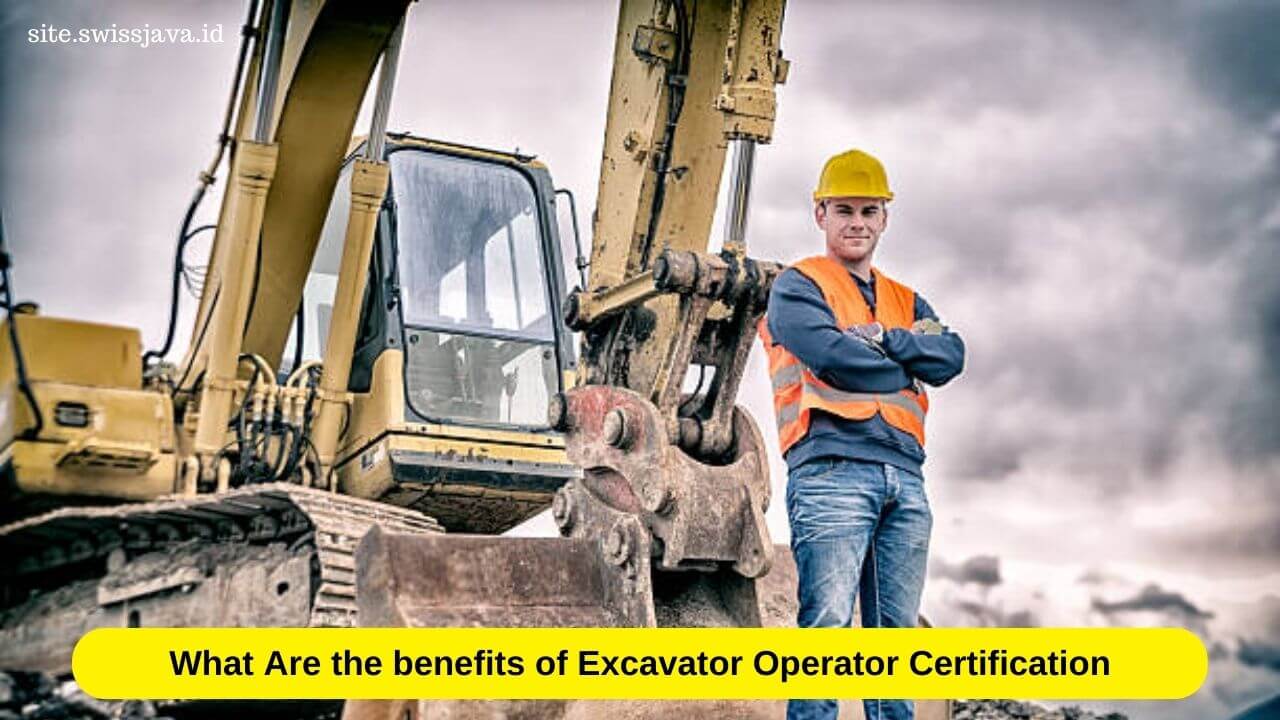Excavator Operator Certification Requirements – An excavator operator is a skilled professional responsible for operating heavy construction machinery, such as excavators, to perform tasks like digging, lifting, and moving earth and materials on construction sites.
Excavator operators must possess in-depth knowledge of the equipment’s controls and functions to ensure precise and efficient operation while maintaining a strong focus on safety.
These operators play a crucial role in various construction projects, including building foundations, road construction, and excavation for pipelines or utilities.
Excavator operators need to have excellent hand-eye coordination, spatial awareness, and the ability to interpret construction plans and markings accurately.
The role of an excavator operator demands physical stamina and mental alertness to manage long hours of machine operation and handle unexpected challenges that may arise during excavation tasks.
What is Excavator Operator Certification

Excavator Operator Certification is a formal recognition or qualification that validates an individual’s knowledge, skills, and ability to operate an excavator safely and efficiently.
The certification process typically involves completing a training program and passing assessments to demonstrate competency in operating excavators.
The purpose of excavator operator certification is to ensure that individuals operating these heavy machinery have the necessary expertise to perform their duties in a manner that prioritizes safety, adheres to industry best practices, and minimizes the risk of accidents or damage to the equipment and surrounding environment.
What Are the Benefits of Excavator Operator Certification

The benefits of Excavator Operator Certification include:
1. Safety
Certified excavator operators have undergone formal training and assessments to demonstrate their competence in operating the equipment safely.
They are well-versed in safety protocols and best practices, reducing the risk of accidents and injuries on the job site.
2. Efficiency
Certified operators possess the necessary skills and knowledge to handle excavators efficiently.
They can operate the machinery with precision, optimizing productivity and completing tasks more quickly and accurately.
3. Reduced Equipment Damage
Competent excavator operators understand the limitations and capabilities of the equipment.
Their proficiency in operating the excavator minimizes the risk of unnecessary wear and tear, extending the lifespan of the machinery and reducing maintenance costs.
4. Compliance
In many regions, excavator operator certification is a legal requirement for operating heavy machinery.
Being certified ensures compliance with local regulations and prevents potential fines or legal issues for both the operator and the employer.
5. Employment Opportunities
Excavator operators with certifications are more attractive to potential employers.
Certification demonstrates a commitment to professionalism and a dedication to safety, making certified operators more likely to be hired for construction projects.
6. Career Advancement
Certified excavator operators have a competitive edge in the job market and may have better opportunities for career advancement within the construction industry.
7. Insurance Benefits
Some insurance companies may offer lower premiums for construction companies that employ certified excavator operators.
This is because certified operators are considered lower risk due to their enhanced skills and safety awareness.
8. Customer Confidence
For construction companies, having certified excavator operators instills confidence in clients, as it indicates a commitment to high-quality work, safety standards, and professionalism.
9. Continuing Education
Excavator operator certification often requires regular renewal and continuing education, ensuring that operators stay updated with the latest industry practices, safety guidelines, and technological advancements.
Overall, excavator operator certification not only enhances safety on construction sites but also benefits operators, employers, and clients by promoting professionalism, efficiency, and compliance with industry standards.
Read More: Crane Rental Services Near Me & Its 5 Advantages 2023
Excavator Operator Certification Requirements

The certification requirements for excavator operators can vary depending on the country or region, as different jurisdictions may have their own regulations and standards.
Additionally, the specific type of excavator and its application (construction, mining, forestry, etc.) may also influence the certification requirements.
Below are some general guidelines for excavator operator certification:
1. Training and Education
Typically, a formal training program is required to become a certified excavator operator.
This training is usually provided by vocational schools, technical institutes, or private training organizations.
The program should cover both theoretical knowledge and practical hands-on training.
2. Age Requirements
Most places require individuals to be at least 18 years old to operate heavy machinery like excavators.
3. Licensing or Certification
Many regions require excavator operators to obtain a license or certification.
The certification process usually involves passing a written exam to demonstrate knowledge of safety regulations, equipment operation, and best practices.
After passing the written exam, operators may need to complete a practical skills test operating an excavator under the supervision of an examiner.
4. Experience
Some certification programs may require a minimum amount of practical experience operating an excavator.
This experience can often be gained through on-the-job training or apprenticeship programs.
5. Health and Safety Requirements
Excavator operators may need to meet certain health and physical requirements to ensure they can safely operate the equipment.
This may include passing a medical examination and meeting specific vision and hearing standards.
6. Renewal and Continuing Education
Certifications are typically valid for a specific period, and operators may need to renew their certification by completing refresher courses or taking additional exams to ensure their skills and knowledge are up to date.
7. Employer Requirements
In some cases, employers may have their own additional requirements for hiring excavator operators, such as specific training or experience levels.
It’s essential to check the local regulations and requirements in the area where you plan to work as an excavator operator, as they can vary significantly.
You can reach out to your local construction or labor authorities to get more detailed and up-to-date information on the certification process.
Read More: Backhoe Loader Rental Costs in 2023
Conclusion
Excavator operator certification requirements encompass a structured training program designed to equip individuals with the necessary skills and knowledge to safely and efficiently operate excavators.
These requirements typically include completing formal training courses that cover equipment controls, safety protocols, excavation techniques, and relevant regulations.
Additionally, candidates must pass written exams and practical skills assessments to demonstrate their competence.
The benefits of excavator operator certification are multifaceted.
Firstly, certified operators significantly reduce the risk of accidents and equipment damage on construction sites due to their enhanced safety awareness and expertise.
Secondly, certification ensures compliance with local regulations, preventing legal issues and potential fines.
Moreover, certified operators enjoy better employment opportunities and may advance their careers within the construction industry.
Clients also gain confidence in construction companies that employ certified excavator operators, as it signals a commitment to professionalism, quality work, and safety standards.
The ongoing requirement for renewal and continuing education helps operators stay up-to-date with the latest industry practices, ensuring a higher level of performance and efficiency in their work.
Ultimately, excavator operator certification benefits both individuals and the construction industry as a whole by fostering safety, proficiency, and professionalism in heavy machinery operation.
